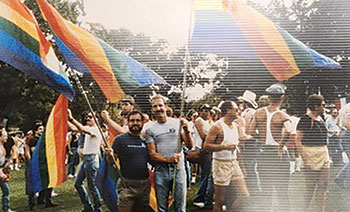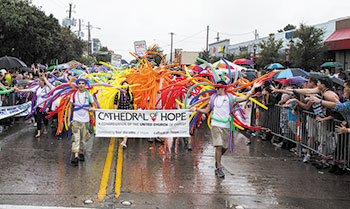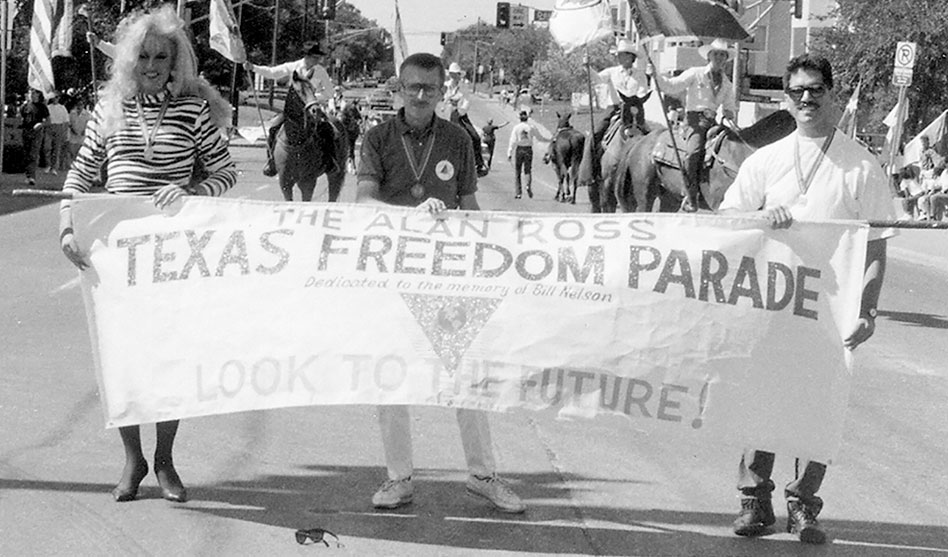Dallas Pride celebrates its 40th anniversary with the music festival, Alan Ross Texas Freedom Parade in Fair Park
TAMMYE NASH | Managing Editor
nash@dallasvoice.com
We have spent five stressful months dealing with attacks on the community from the right-wing forces in the Texas Legislature. But now the legislature’s regular session has ended, and Pride Month has begun.
It’s time to step out of the shadow of hate and into the sunlight of a proud and visible community. And Dallas Pride is the perfect way to get the month started.
Organizers are expecting thousands of revelers to pack into Dallas’ Fair Park this weekend for the 40th annual Dallas Pride celebration that includes the Dallas Pride Music Festival on Saturday, June 3, and the Alan Ross Texas Freedom Parade on Sunday, June 4.
The festival opens at 11 a.m. on Saturday, and promises a full day of vendors and musical and dance performances on three different stages, plus separate entertainment lineups in the Family Pride Zone and the Teen Pride area.
Admission is $10 for adults ages 20 and up, $5 for teens ages 13-19 and free for children ages 12 and under.
The crowds will return on Sunday, though, for the Alan Ross Texas Freedom Parade. The parade, which is free to attend and, of course, open to the public, steps off at 2 p.m. Organizers said there will be more than 150 entries in the parade, offering up “outrageous costumes, inventive floats” and “a rainbow feast for the eyes.”
 Dallas Voice’s DVtv crew will be at Fair Park for both days of Dallas Pride, so look for our crew to wave to the fans at home. We will have a booth at the festival on Sunday, handing out swag — including the ever-popular Dallas Voice Big Gay (pop) Fans and a Big Gay Bag to carry everything around in. Staff members will be handing out Big Gay Fans at the parade on Sunday, too.
Dallas Voice’s DVtv crew will be at Fair Park for both days of Dallas Pride, so look for our crew to wave to the fans at home. We will have a booth at the festival on Sunday, handing out swag — including the ever-popular Dallas Voice Big Gay (pop) Fans and a Big Gay Bag to carry everything around in. Staff members will be handing out Big Gay Fans at the parade on Sunday, too.
CW33, the only locally-owned TV station in Dallas/Fort Worth, will be back again this year — along with Jeff Watts Productions — to broadcast the parade live on Sunday. This year’s broadcast will feature an appearance by Karamo, host of the NBCUniversal daytime talk show, aptly named Karamo, and the culture expert on Netflix’s Queer Eye.
“I am beyond excited to celebrate Dallas Pride,” Karamo said. “Supporting and advocating for the LGBTQ community is something near and dear to my heart. Being able to celebrate and come together is what keeps us going.”
Karamo will co-host the live broadcast with Jenny Anchondo, producer and host of CW33’s Emmy-nominated Inside DFW With Jenny Anchondo.
“To have Karamo in town with his wit, talent and charm will be an absolute blast,” Anchondo said. “I’m honored to again serve as co-host and be part of this long-standing celebration.”
Parking at Fair Park is $10 both days, but you can also choose to take the DART Green Line which drops off and picks up passengers right at the Fair Park Main Gate. The Green Line has 24 stations on its route starting in the southeast corner of Dallas at the Buckner station and heading north and east all the way up to the North Carrollton/Frankford Station at the other end. And of course, you can always catch the light rail at whichever station is closer to your starting point and then transfer to the Green Line. If you live in Fort Worth or the Mid Cities, just hop on the Trinity Express and head east, then catch the Green Line at Victory Station on Saturday. TRE doesn’t run on Sunday.
The history of Dallas Pride
The theme for this year’s Dallas Pride is “40 and Fabulous,” celebrating the 40th anniversary of the event under the management of the Dallas Tavern Guild. But Dallas’ LGBTQ community started celebrating far earlier than 1984.
 By June 1972, the gay liberation movement that had started in June 1969 in New York City with the Stonewall Riots had reached Dallas.
By June 1972, the gay liberation movement that had started in June 1969 in New York City with the Stonewall Riots had reached Dallas.
That month, about 50 people gathered in downtown Dallas, marching through the streets to declare that they were, indeed, LGBTQ and proud. A year later, Dallas’ LGBTQ community staged its second march through the streets of downtown.
But that was the last such march for seven years — until June 1980, when the third Dallas Pride parade hit the streets of the Oak Lawn gayborhood.
Then came Aug. 17, 1982, and Dallas District Judge Jerry Buchmeyer issued his ruling in Baker v. Wade, overturning Texas’ archaic sodomy law, setting off jubilant celebrations around the state. In Dallas, activists staged a huge rally in what is now Turtle Creek Park to celebrate.
The following year, in September 1983, the community again gathered in the park situated in the heart of the gayborhood to celebrate LGBTQ civil rights.
By September 1984, the Dallas Tavern Guild had stepped up and decided to plan and produce a Pride parade in Dallas, with then-DTG Executive Director Alan Ross in charge. They called it the Texas Freedom Parade, and they scheduled it for the third Sunday in September as a continuing celebration of Judge Buchmeyer’s ruling on 21.06.
Even though the 5th Circuit Court of Appeals overturned Buchmeyer’s ruling in August 1985, Dallas’s Pride celebration would not be deterred, with organizers in 1985 expanding the parade to include trophies for winning entries in various categories and naming two official grand marshals, lesbian author Rita Mae Brown and local activist Howie Daire.
As the years passed, the Texas Freedom Parade continued to grow and evolve, changing to reflect the changing face of the community as AIDS made its presence felt, and as the community began to claim the rights they’d fought so long for. By 1991, longtime Tavern Guild executive director and parade organizer Alan Ross had been diagnosed with AIDS, and his health was beginning to fail. Tavern Guild members decided to honor their friend by renaming the parade in his honor: The Alan Ross Texas Freedom Parade.
In September 1993, the parade Micah England’s victory in her lawsuit challenging then Police Chief Mack Vines’ and the Dallas Police Department’s anti-LGBTQ hiring policies. The very next year, in September 1994, new DPD Chief Ben Click made Texas Freedom Parade history as the first Dallas chief of police to ride in the parade.
Alan Ross died in 1995 and was succeeded by Alan Gellman, longtime publisher of This Week in Texas. In September 2001, the parade was scheduled just days after the terrorist attacks of 9-11. Rather than cancelling the parade, Steve Miles — who had succeeded his partner Alan Gellman as DTG director after Gellman’s death — organized a pared down and somber parade focused on honoring the victims of 9-11.
In 2002, Laura Miller became the first sitting mayor of Dallas to ride in the Pride parade. Then in 2003, the parade celebrated the U.S. Supreme Court’s ruling in Lawrence v. Texas overturning the Texas sodomy law.
In 2004, the parade celebrated Massachusetts’ legal recognition of same-sex marriage, and in June 2015, the landmark ruling in Obergefell v. Hodges establishing marriage equality as the law of the land.
Michael Doughman took over as part-time Tavern Guild director and parade organizer, and in 2004, his role became full time. Because of changes in city regulations, the Tavern Guild was forced to begin fencing Lee Park for the festival after the parade, charging a minimal admission to pay for increasing costs. DTG then moved the festival from Lee Park down Turtle Creek Boulevard to Reverchon Park, and organizers also decided to move the Festival in the Park, traditionally held at the end of the parade, to the day before the Parade to create a day-long musical festival and a full weekend of Pride events.
In 2018, Doughman announced that he had decided to retire, and that the 2018 parade would be his last. The Tavern Guild hired Jaron Turnbow to work with Doughman in 2018 then take over after the September celebration that year when Doughman stepped down. Doughman moved to Puerto Vallarta but, tragically, died there the next June following a years-long battle with diabetes.
Before Doughman had retired though, he and the parade organizers had announced plans to move the festival and parade to the first weekend in June and to hold the celebrations at Fair Park in an effort to offset rising costs and allow the parade to grow even more and become a touchstone of June Pride Month.
That 2019 Pride weekend turned out to be a success, and organizers were looking forward to building on that success in 2020. But the COVID pandemic hit hard, forcing organizers to cancel all in-person events, replacing them instead with an online celebration that happened in July. By June 2021, the world had begun to open up again, but lasting restrictions and a resurgent wave of the virus prompted organizers to trade the music festival and parade for a two-night stage show inside the coliseum at Fair Park. The shows allowed for the necessary social distancing and heightened health safety measures while at the same time bringing the excitement of a live and in-person party back to Pride.
June 2022 saw the return, at last, of the traditional Saturday Music Festival and Sunday Freedom Parade. Now in 2023, the LGBTQ community here in Texas and around the country — especially the transgender community and the drag community — is once again under attack from right-wing forces, so expect a Pride celebration that harkens back to the determination of those activists in 1969 and 1972 and 1984 who made Pride a celebration AND a protest.
Look for the 50 Years of Dallas Pride Parades exhibit at Fair Park during the Music Festival on Saturday. The exhibit was compiled by and is sponsored by Dallas Voice, The Dallas Way, UNT Library Special Collections and the Pride Museum of Texas.













